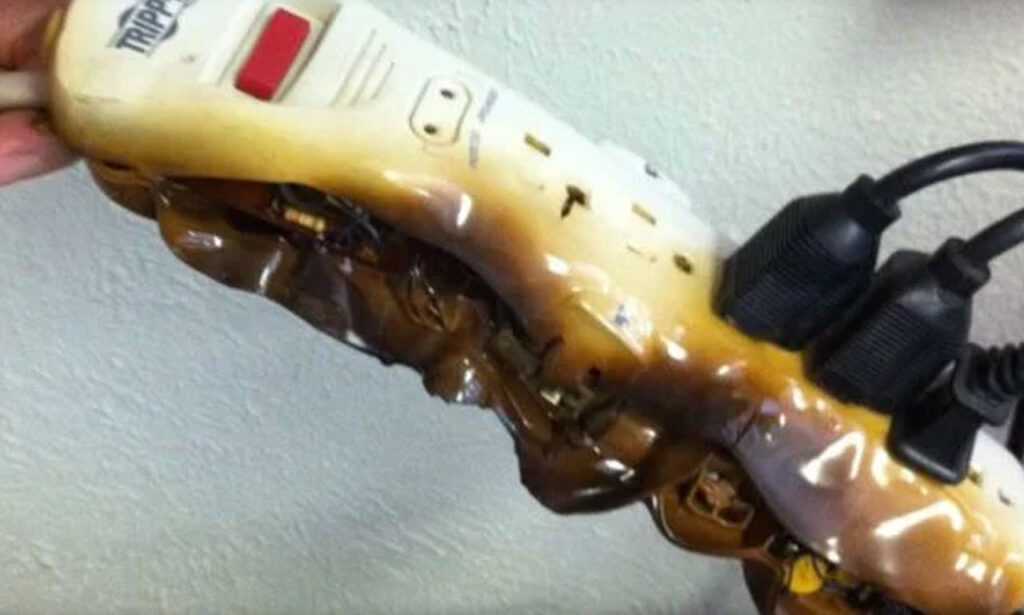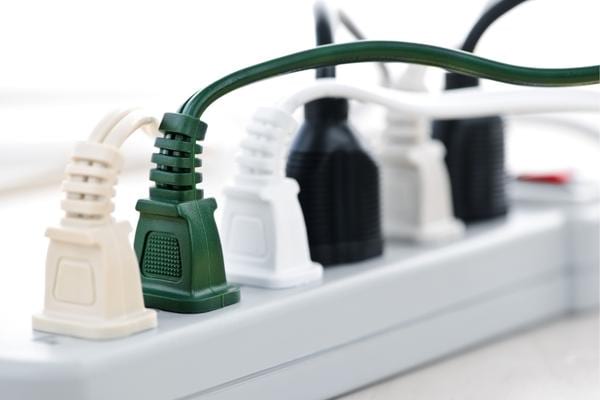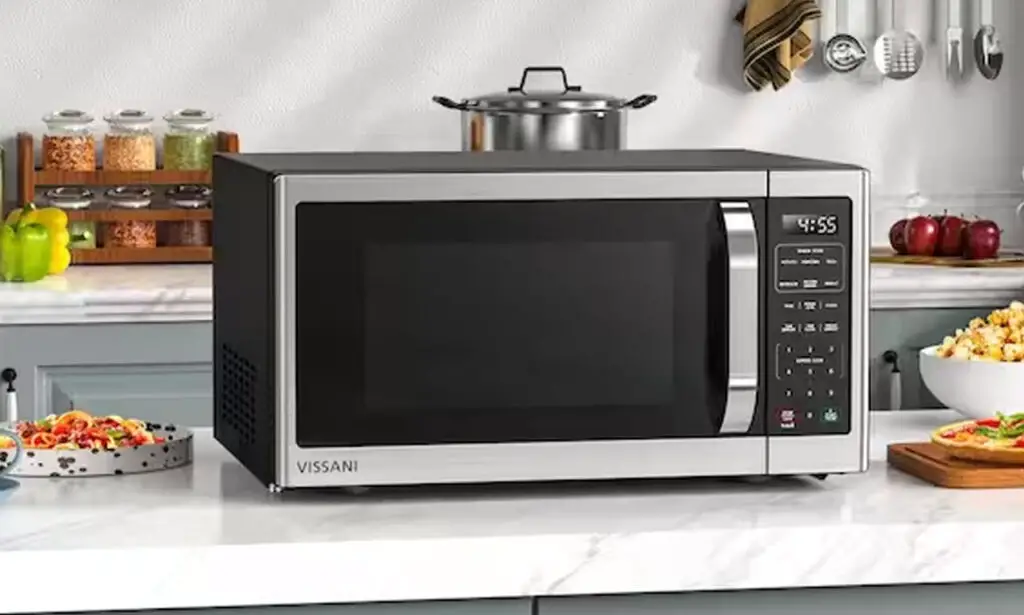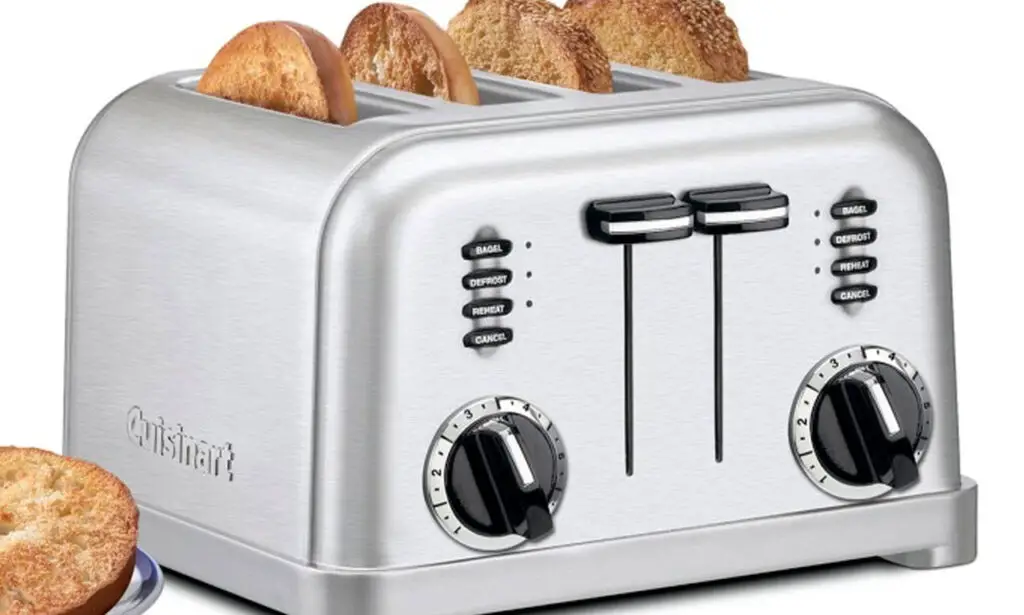
When we think of the past, one of the first thoughts that runs through our mind is how people lived without electricity. Nowadays, we can’t even imagine a day without it because all of our appliances and devices run on electricity.
The truth is, however, that most homes don’t have enough power outlets to keep everything running and charged, so most of us rely on power strips without being aware that appliances that consume a lot of energy become dangerous fire hazards when we plug them into a power strip.
Although power strips are the thing to go to when it comes to charging your phone or power an entertainment setup, there are certain devices that should never be plugged into a power strip.
Air conditioners, space heaters, toasters, and other appliances that use high wattage can easily cause power strips to overheat, which can easily lead to a fire hazard.

Even before plugging anything into a power strip consider the ammount of power they support. This is usually listed on the product itself.
High-capacity appliances need to draw a lot of power through an electrical circuit to work. Keep in mind that an appliance does not need to be large in size to draw large amounts of power.
Below is the list of appliances that should never be plugged into a power strip.
1. The oven: Even though the oven is not used continually, it is a power-hungry appliance that should not be plugged into a power strip. In fact, it should be plugged into its own wall outlet on its own circuit.
2. Refrigerator: Refrigerators require a lot of power and frequently cycle on and off which can easily overload a power strip and cause damage. Much like the oven, refrigerators require a wall outlet dedicated solely to powering the appliance.

3. Washing Machine: When turned on, washing machines pull a lot of power. This is the main reason why these appliances shouldn’t share a receptacle with any other appliance or device.
Most washing machines use a max of up to 1400 watts, putting it dangerously close to the max load of most power strips. On top of that while working, washing machines are usually left unattended and work longer hours, at least an hour, which is long enough for a power strip to overheat.
4. Heating: Portable heaters should never be plugged into a power strip because most of them use 1,500 watts of energy on their high setting and they usually run for extended periods of time.

5. Microwave: Since they consume a lot of energy when used, most microwave ovens are plugged into their own receptacle and that is always a good practice.
6. Coffee Maker: Those who own a coffee maker are not fully aware of the power these appliances use, and this is why they should never be plugged into any sort of power strip or extension cord.

7. Toaster: You may think that browning up slices of bread or bagels doesn’t require a lot of energy, but the truth is that toasters use a lot of energy when in use and they should be plugged directly into the receptacle rather than a power strip.
8. Another Power Strip: Power strips are not meant to be used in conjunction with another power strip, although many people do exactly that. This, however, violates most safety codes because it can easily lead to overloading the electrical system.
9. Electronics (Computer, TV, Router): These types of electronic devices don’t necessarily use a lot of power on their own, but they are sensitive to surges and you can find yourself with a burnt out computer or TV very quickly if you plug them into a power strip.
If you want to protect these sensitive devices from power surges, opt for a power strip that functions as a surge protector.
Texas man smashes autographed Taylor Swift guitar after buying it for $4,000

A Texas man is going viral after bidding on a guitar signed by Taylor Swift and then smashing it with a hammer.The video, which has since been shared on multiple social media networks, shows the man grab the guitar after placing the winning bid of $4,000 and attempting to break it into pieces.
“When the man announced his intention to smash it the camera phones came out,” an event attendee told The Independent.
The viral moment happened at the Ellis County Wild Game Dinner in Waxahachie, Texas on September 28. The event acted as a fundraiser to support agricultural and rural education for the local youth.
Tickets to see George Strait and Chris Stapleton, an African safari, a trip to the Kentucky Bourbon Trail, and the Taylor Swift guitar were among the prizes being auctioned off.
When it came time to start the bidding on the Taylor Swift guitar, one man offered $3,200 for the signed guitar. According to the event organizer, the winning bidder paid $4,000 for the item.
In the viral video, the winner can be seen approaching the stage to claim the guitar. As he grabs the guitar, he is also handed a hammer which he takes and swiftly begins hitting against the instrument.
Some viewers have suggested the man beat the guitar due to Swift’s recent endorsement of Kamala Harris, though according to TMZ the guitar was donated well before Swift made her announcement.
The man’s actions sparked a debate with some people applauding him for destroying the guitar and others saying he should have donated his money directly to charity.
“What a waste of money,” one person wrote.
“It wasn’t a waste of $$ at all! The $4,000 he spent did go to the kids. The proceeds for the dinner went to the Future Farmers of America,” another chimed in.
What do you think of this man’s actions? Let us know in the comments.



Leave a Reply